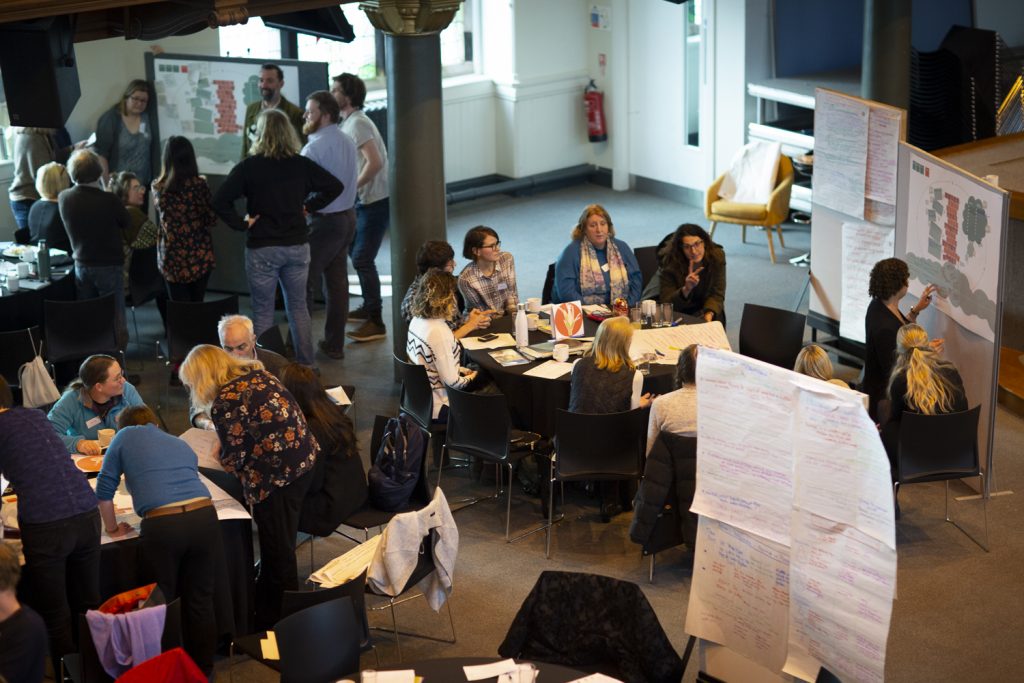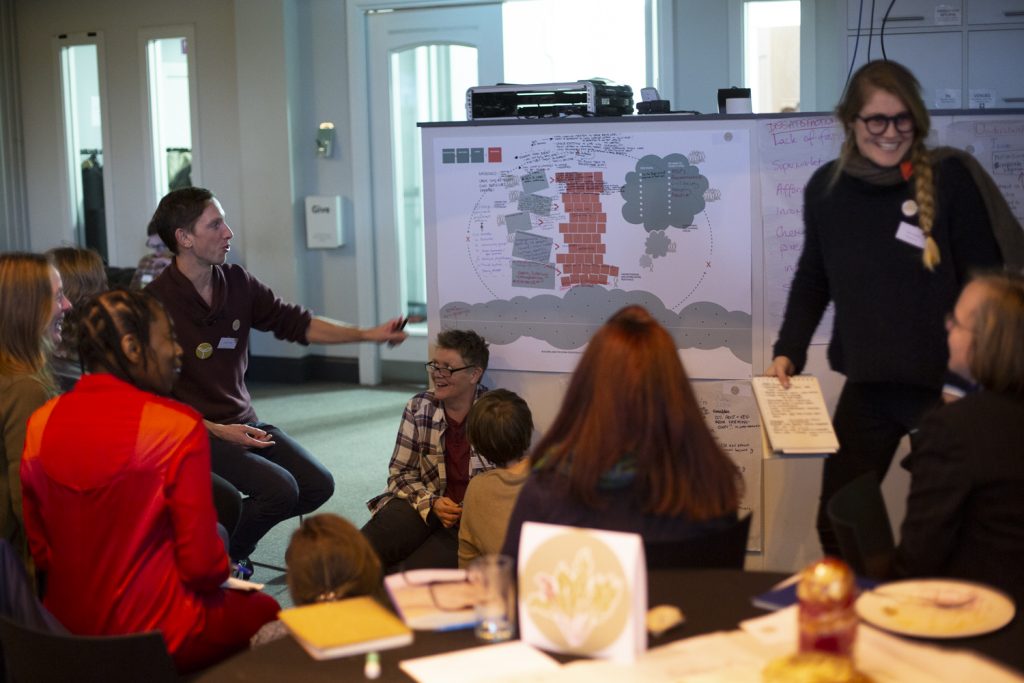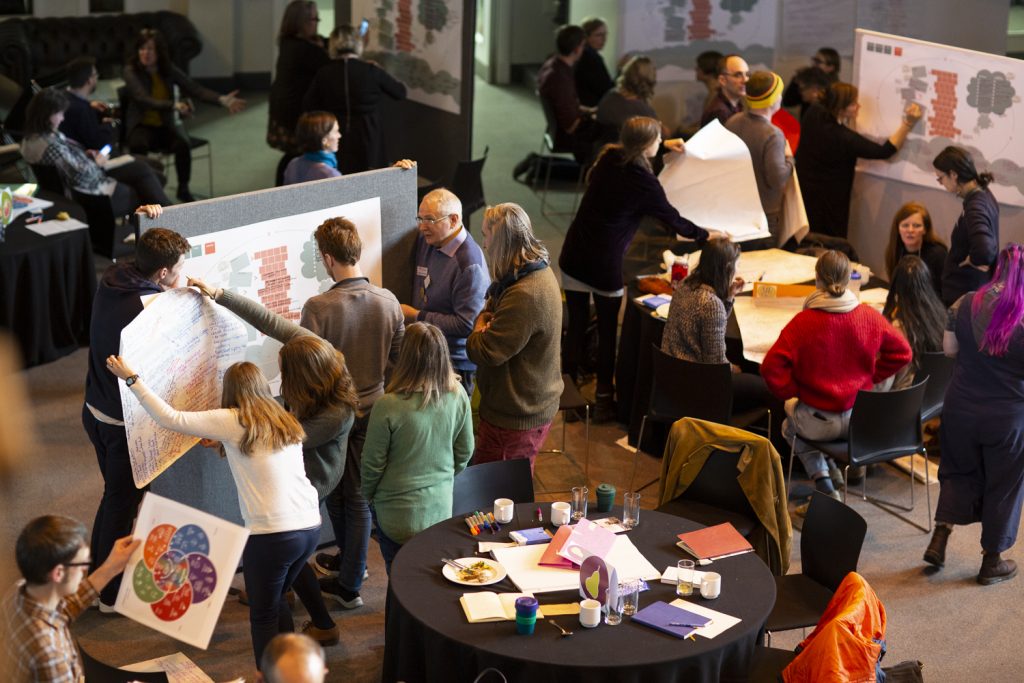Revisiting the game plan for a Good Food Nation: Has the pandemic moved the goal posts?
A year ago, roughly four months before the UK locked down with the pandemic, Nourish brought together 150+ experts to work on a ‘game plan’ for transforming Scotland into a Good Food Nation. The Conference’s anniversary is a good time to reflect on how things have changed.
The outcomes of the conference illustrated above all the scale and complexity of the challenges we face
Nobody expected that becoming a Good Food Nation would happen without major change at all levels. We also knew these cannot happen only from the top down, and that people and communities need to have a place at the heart of this process. The Russian Doll featured as a powerful metaphor that demonstrated that reshaping the smallest doll (our values at the core) will gradually lead to reform of the outer layers (viz. infrastructure and policies, and the resources available for this structural rebuild) as these will no longer fit properly if left unchanged.
When participants were asked to look at what stands in the way of achieving their visions for a better food system, they identified resistance at all levels. At higher levels they highlighted the growth-economy that prioritises high-tech large-scale extractive agriculture, a focus on food production for export, benefit to shareholders and monopolies that undermine the local food economy. At community level, they identified challenges around low-level participation in local activities, a largely transient population, isolation, and insufficient collective resources (e.g. land, tools), knowledge and skills. Patterns in people’s personal thinking also featured as resistors to change, including food being taken for granted, not linking food with health and well-being, and prioritising cost and convenience above everything else.
Meanwhile, the pandemic turned changed our lives, not least the ways we manage our food
As government instructed everybody to ‘Stay At Home’, closing schools, shops and other businesses, many people changed to working from home, with fewer other activities also taking place outside the home. As we tried to minimise social contact, ordering food online surged. More households started doing more cooking at home, eating together, growing their own food, and participating in projects focused around distributing and producing food within their community. Many households were forced to survive on reduced income. Soon the magnitude of food insecurity and hunger, new and pre-pandemic, became publicly exposed. Food banks multiplied, and a wide range of community initiatives around feeding vulnerable people cropped up, often using surplus food stocks that became harder to locate as the crisis unfolded.
As time went on, appalling statistics around health inequalities came to light and the relative lack of resilience of particular sectors of society began to be traced to unhealthy diets resulting directly from deliberate austerity policies. The thinking around how food poverty needs to be tackled also shifted away from charitable actions with the help of volunteers (e.g. through foodbanks) and redistribution of what is essentially society’s waste produce. Instead of shaming and victim-blaming, hear how these matters are now less often described as private challenges, and access to nutritious food is now increasingly actively linked with a right to health and well-being.
The pandemic has also brought about changes in how we experience our communities
Restrictions on moving around led to home confinement, localised exercise and generally reduced people moving around. Stronger local bonds are established as we catch up with neighbours on local walks and in queues at local shops. Community spaces were converted for a range of new purposes around food for families and elderly neighbours. New networks were set up to run pantries, collective purchasing, community gardening, surplus food redistribution, with participation from a wide range of people that had never before taken part in any form of community activity. The pandemic changed community dynamics in positive ways in many places, to engage many more people, and to grow greater awareness of the benefits that a strong local community affords.
Having to queue for food, seeing shelves empty, hearing about the magnitude of food poverty in our neighbourhoods and the many community food redistribution projects, means that we no longer take food for granted. It is taking a more central and valued place in our lives, and the inequities we witness are more readily regarded as matters of fairness and justice. The pandemic has reminded us of important values and transformed our thinking about food in positive ways. The focus is now on persuading higher level political and economic powers to formulate policies and build infrastructure that ensure lasting structural change to our food system.
Upcoming political events provide several opportunities to pin our hopes on
The new EU Farm to Fork programme launched in May 2020 offers a strong source of inspiration and a model for change in the right direction for when CAP payments cease. While the Good Food Nation Bill was dropped by Scottish Government at the start of the pandemic, there are renewed hopes that its reintroduction will be proposed as part of the manifestos for May 2021 elections. Meanwhile, preparations for the postponed COP26 in Glasgow next year are also gaining momentum. These high-level political events offer Scottish Government unique chances to shine both within the UK and on the international stage by furthering its progressive rhetoric around the well-being economy and by committing to ambitious climate targets.
As our conference participants reminded us, growth-economy thinking needs to be challenged in that it drives all the things that are so damaging to the environment and undermine our local food economy. Instead, we need new policies and infrastructure that further the agenda of community wealth-building, especially now local mobilisation has emerged with renewed energies and current food system thinking is being challenged from the bottom up.
Watch this space. There is a lot to look forward to.


